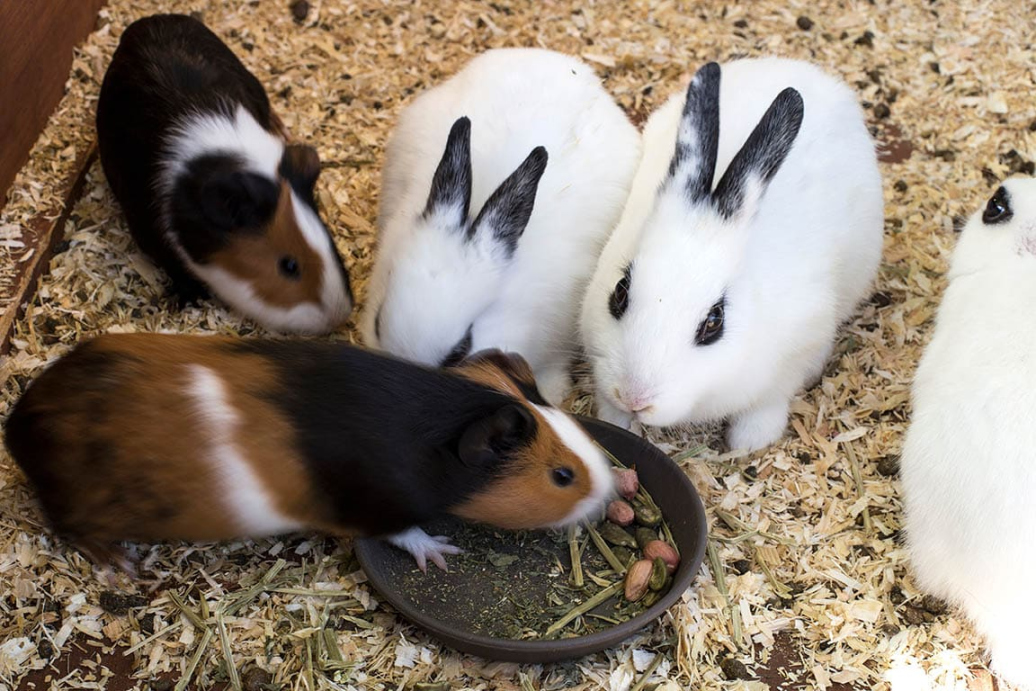Why Can’t Guinea Pigs Eat Rabbit Food?
Guinea pigs and rabbits are both popular pets that many people enjoy having in their homes. While they may seem similar in some ways, it is important to understand that they have different dietary needs. One common question that often arises is whether guinea pigs can eat rabbit food. The short answer is no, and there are several reasons why this is the case.

Different Nutritional Requirements
Guinea pigs have specific nutritional requirements that must be met in order for them to stay healthy. They need a diet that is high in vitamin C, as they are unable to synthesize this essential nutrient on their own. Additionally, guinea pigs require a diet that is low in sugar and high in fiber to maintain proper digestive health.
Rabbit food, on the other hand, is specifically formulated to meet the nutritional needs of rabbits. It typically does not contain enough vitamin C to meet a guinea pig’s requirements and may be too high in sugar for their sensitive digestive systems. Therefore, feeding guinea pigs rabbit food can lead to nutritional deficiencies and digestive issues.
Differences in Ingredients
Rabbit food and guinea pig food are made with different ingredients to meet the specific needs of each animal. Rabbit food often contains ingredients that are not suitable for guinea pigs, such as alfalfa. While rabbits can digest alfalfa without any issues, guinea pigs can develop bladder stones from consuming too much calcium, which is abundant in alfalfa. Therefore, feeding guinea pigs rabbit food can put their health at risk.
Guinea pig food, on the other hand, is typically made with timothy hay as the primary ingredient. This type of hay is much lower in calcium and better suited for guinea pigs’ nutritional needs. It also helps to wear down their continuously growing teeth and keeps their digestive system healthy.
Potential Health Risks
Feeding guinea pigs rabbit food can lead to a variety of health issues. As mentioned before, nutritional deficiencies may occur due to the lack of vitamin C. Guinea pigs that do not receive enough vitamin C can develop scurvy, which can cause symptoms such as weakness, swollen joints, and bleeding gums.
Furthermore, the high sugar content in rabbit food can disrupt the delicate balance of bacteria in a guinea pig’s gut, leading to digestive problems such as diarrhea and bloating. These issues can be uncomfortable for the guinea pig and may require veterinary intervention to resolve.
Frequently Asked Questions (FAQs)
1. Can guinea pigs eat rabbit pellets?
No, guinea pigs should not eat rabbit pellets. Rabbit pellets are formulated specifically for rabbits and do not meet the nutritional needs of guinea pigs. Guinea pigs require a diet that is high in vitamin C and low in sugar, which is not provided by rabbit pellets.
2. Can guinea pigs eat rabbit hay?
Guinea pigs can eat rabbit hay, but it is not ideal for their nutritional needs. Rabbit hay is often made from alfalfa, which is high in calcium. Guinea pigs require hay that is primarily made from timothy grass to maintain proper digestive health.
3. What happens if a guinea pig eats rabbit food?
If a guinea pig eats rabbit food, it could potentially lead to nutritional deficiencies, digestive issues, and other health problems. Guinea pigs need a specific balance of nutrients that is not provided by rabbit food, so it is important to feed them a diet specifically formulated for guinea pigs.
4. Is it safe for guinea pigs and rabbits to share the same food?
No, it is not safe for guinea pigs and rabbits to share the same food. While they may both enjoy certain vegetables and hay, their nutritional needs differ. Mixing their food can lead to imbalances in their diet, which could result in health issues for both animals.
Related Articles…
Copyright Notice:
All images on this website are obtained from the internet and remain copyrighted to their original owners. If you hold copyright to any image and want it taken down, please reach us.
